Everything you should know about CAA and NRC
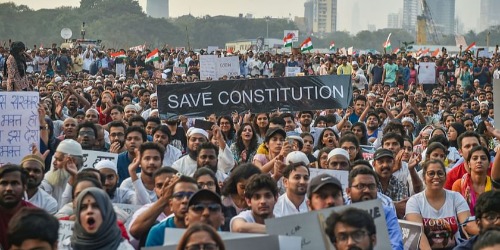
It is perhaps a first in independent India's political history. The protest against the Citizenship (Amendment) Act (CAA), 2019 has spread to almost every corner of the country, yet the reasons for the protest vary with the geography. Some are protesting because the CAA allegedly violates the secular identity of the country while others fear that it will endanger their linguistic and cultural identity. Yet others believe that while the CAA itself is innocuous, combined with the proposed nationwide National Register of Citizens (NRC), an exercise that has run into controversy in Assam, it will become a tool to exclude the Muslim population of the country. That the Union government has been hit hard by this allegation is evident from the fact that Prime Minister Narendra Modi has publicly contradicted home minister Amit Shah's assertion that a nationwide NRC will be prepared by 2024.
So why has the country against the NRC, which has made even the Modi government do a volte face? How is it connected to the CAA? If implemented, what will be their implications for the aam aadmi, irrespective of religion or geography?
What is the CAA?
According to the CAA, Hindu, Christian, Buddhist, Jain, Sikh and Parsi migrants who have entered India illegally-that is, without a visa-on or before December 31, 2014 from the Muslim-majority countries of Pakistan, Afghanistan and Bangladesh and have stayed in the country for five years, are eligible to apply for Indian citizenship.
Why is the provision extended only to people of six religions, and not Muslims, and why does it apply only to people coming from these three countries?
The Union government claims that people of these six faiths have faced persecution in these three Islamic countries, Muslims haven't. It is, therefore, India's moral obligation to provide them shelter.
So, is the provision open only to those who have been persecuted in the three countries?
No, the CAA itself does not mention the word 'persecution' anywhere, contrary to the BJP's assertion that the act covers only persecuted people. And since persecution is not the criterion, it does discriminate against illegal Muslim immigrants from these three countries.
If the act is not only about people facing persecution, why are migrants from other countries -- such as Hindus from Sri Lanka -- not eligible to apply for citizenship under this act? Or Muslim (Rohingya) migrants from Myanmar?
The government says this is a time-bound provision to provide relief to immigrants who have suffered in Islamic countries because India got divided on religious lines. India has, from time to time, provided citizenship to immigrants of all religions from different countries. Sri Lankan Tamil Hindus, too, were given citizenship in the 1970s and 1980s. The Union government has openly said that the Rohingyas are a threat to national security. Even an Islamic country like Saudi Arabia has deported Rohingya migrants. The BJP's logic is that Hindu migrants have only India to fall back on while Muslim migrants have several Islamic countries to seek shelter in.
How is the CAA connected to the NRC?
The two have no connection. The NRC is a count of legitimate Indian citizens. Barring the state of Assam, this exercise has never been done anywhere in the country. Union home minister Amit Shah has said he will frame a nationwide NRC by 2024 to detect illegal migrants. On December 22, Prime Minister Narendra Modi said his government had never said anything about an NRC except in Assam.
What will be the basis of the proposed nationwide NRC?
The Union home ministry had framed the rules for a nationwide NRC in 2003, following an amendment to the Citizenship Act, 1955. These rules categorically state that the central government shall, for the purpose of the NRC, carry out a house-to-house enumeration for collection of specified particulars relating to each family and individual residing in a local area, including the citizenship status. So, unlike what many are claiming, people will not be asked to submit documents related to their grandparents. Just like people present their identity cards or any other document for registering their names in the voter list or getting an Aadhaar card, similar documents will need to be provided for the NRC.
Any document related to date and place of birth will suffice as proof of citizenship. However, the decision on what documents will be acceptable is still pending. They are likely to include voter ID cards, passports, the Aadhaar card, driving licences, insurance papers, birth certificates, school-leaving certificates, documents relating to land or home or other government-issued documents. If a person is illiterate and does not have the relevant documents, the authorities will allow them to bring a witness. Other evidence and community verification will also be allowed.
Is the NRC an exercise to exclude Muslims?
No. Even in Assam, of the 1.9 million people excluded from the NRC, 1.3 million are Hindu and from indigenous tribes, as unofficial sources confirm. That also explains why the BJP has rejected the NRC in Assam. A scrutiny of the 2003 guidelines for a nationwide NRC reveals that there is no provision that can exclude a legal Muslim citizen from the NRC.
But the CAA does exclude Muslims.
The CAA excludes Muslim immigrants who have entered India illegally, not legal Indian Muslim citizens.
However, since the CAA will provide citizenship to non-Muslim illegal immigrants from three countries, only Muslim immigrants will be left out when the NRC is rolled out.
Is it not a clever way for the RSS-BJP to realise their dream of a Hindu Rashtra?
Partly true. The CAA will provide citizenship to illegal non-Muslim migrants from three countries and who have entered India before December 31, 2014. An honest NRC should exclude illegal migrants of all religions. That, however, will depend on the intent of the government and a framework that is flawless, a huge challenge for Amit Shah. There is nothing wrong per se with the exercise of detecting illegal migrants-irrespective of their religion-but to discriminate on the basis of religion is against India's secular ethos, especially when the CAA does not specify that it will cover people who have faced religious persecution.
Do you support NRC & CAA?
- 594
- Leave a comment
Petition Filed in Supreme Court Against Pension To Politicians
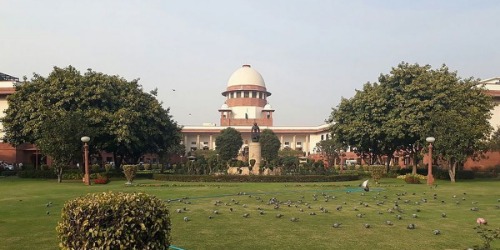
Petition Filed in Supreme Court Against Pension To Politicians
Now a leader of the leaders has filed a PIL in the Supreme Court...
2018 Improvement Act:
MPs should not get pension because politics is not a job or employment, but a free service. - Politics is an election under the Public Representation Act, there is no retirement, but they can be re-elected in the same situation again. (Currently they get pension, after 5 years of service).
One more disorder in this is that if a person has been a councilor first, then becomes a legislator and then becomes an MP, then he gets not one but three pensions.
This is a great betrayal with the citizens of the country who immediately have to ACT to stop this...
With the Central Pay Commission, salary allowance of MPs is being revised ....This should be brought under the income tax....
At present, MPs increase their salaries and allowances arbitrarily by voting for themselves and at that time all the parties are united.
MPs health care system should be discarded.. and health care like public health of India should take care of them like any other citizen.. Presently their treatment often is done abroad.. if they have to get it done abroad, they should get it done at their own expense.
All concessions to them, such as, electricity, water and phone bill should end. (They not only get many such concessions but they also increase them regularly) -
Criminals should be prevented from contesting elections, suspicious persons with punitive records, criminal charges and determination, past or present should be banned from the Parliament..
Financial losses caused by them, due to politicians in the office, should also be recovered from them, their nominees, properties - MPs should also follow the same rules applicable to common citizens.
No deduction on LPG gas subsidy by the citizens... unless the subsidies available to MPs and MLAs, & Other subsidies, including subsidized food in the Parliament canteen, are not withdrawn.
Serving in the Parliament is an honor, not a lucrative career for looting.
Free rail and airplane travel should stop.
Why does the common man have to bear their fun?
Share & Support this Cause..
You are requested to spread this message to all the people in your contact and in turn ask them to forward further also.
Every citizen should raise voice in India.
Do you think this is the right time to raise this issue?
Full list of new portfolios in Modi govt 2.0
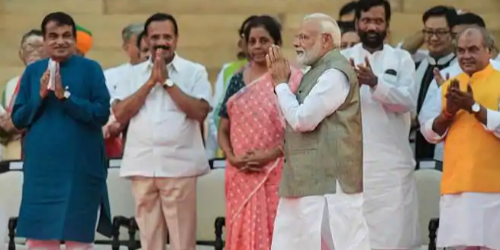
President Ram Nath Kovind has announced the list of ministries on the advice of Prime Minister Narendra Modi. BJP president Amit Shah is the new Home Minister replacing Rajnath Singh while Rajnath Singh will be replacing Nirmala Sitharaman as the Defence Minister.
Prime Minister Narendra Modi will hold the charge of Ministry of Personnel, Public Grievances and Pensions; Department of Atomic Energy; Department of Space; and All important policy issues and all other portfolios not allocated to any minister.
24 MPs took oath as Cabinet ministers in the new Modi government at a gala swearing-in ceremony at the Rashtrapati Bhavan on Thursday. In two of the most significant moves, BJP president Amit Shah took oath as a Cabinet minister right after PM Modi and Rajnath Singh and the appointment of former foreign secretary S Jaishankar as a Cabinet minister.
Here's the complete list of portfolios:-
CABINET MINISTERS:
Rajnath Singh, who held the Home Minister in the previous Modi government is the new Defence Minister replacing Nirmala Sitharaman.
BJP president Amit Shah, who contested his first ever Lok Sabha election, has been appointed the new Minister of Home Affairs in the second edition of the Modi government.
Nitin Jairam Gadkari will continue to hold his position as the Minister of Road Transport and Highways. He will also be the Minister of Micro, Small and Medium Enterprises.
DV Sadananda Gowda will be the Minister of Chemicals and Fertilizers.
Nirmala Sitharaman who was the former Defence Minister in the previous Modi government has replaced her mentor Arun Jaitley as the new Minister of Finance; and Minister of Corporate Affairs.
Lok Janshakti Party (LJP) chief Ramvilas Paswan has been appointed the Minister of Consumer Affairs, Food and Public Distribution.
Narendra Singh Tomar is the new Minister of Agriculture and Farmers Welfare;
Minister of Rural Development; and Minister of Panchayati Raj.
Ravi Shankar Prasad will continue as the Minister of Law and Justice and will also be the Minister of Communications and Minister of Electronics and Information Technology.
Harsimrat Kaur Badal will continue to be the Minister of Food Processing Industries.
Thaawar Chand Gehlot is the new Minister of Social Justice and Empowerment.
Former foreign secretary Subrahmanyam Jaishankar has been given the prime post of Ministry of External Affairs. He was a key force in India's relations with the US and China in the past five years of the Modi government. Jaishankar's appointment as a minister came as a big surprise during the swearing-in ceremony on Thursday.
Ramesh Pokhriyal 'Nishank' is the new Minister of Human Resource Development replacing Prakash Javadekar.
Arjun Munda is the new Minister of Tribal Affairs.
Smriti Zubin Irani, who beat Congress president Rahul Gandhi in his home turf Amethi and turned to be the biggest winner of the Lok Sabha elections, has been handed the Ministry of Women and Child Development along with the Ministry of Textiles. Smriti Irani has replaced Maneka Gandhi.
Dr. Harsh Vardhan is the new Minister of Health and Family Welfare, replacing JP Nadda. Vardhan will also be the Minister of Science and Technology and
Minister of Earth Sciences.
Prakash Javadekar is the new Minister of Environment, Forest and Climate Change and Minister of Information and Broadcasting.
Piyush Goyal continues to hold the Ministry of Railways and will also be the Minister of Commerce and Industry.
Dharmendra Pradhan is the Minister of Petroleum and Natural Gas and
Minister of Steel.
Mukhtar Abbas Naqvi will be the Minister of Minority Affairs.
Pralhad Joshi will be the Minister of Parliamentary Affairs, Minister of Coal and
Minister of Mines.
Dr. Mahendra Nath Pandey will be the Minister of Skill Development and Entrepreneurship.
MINISTERS OF STATE (INDEPENDENT CHARGE):
Santosh Kumar Gangwar: Minister of State (Independent Charge) of the Ministry of Labour and Employment.
Rao Inderjit Singh: Minister of State (Independent Charge) of the Ministry of Statistics and Programme Implementation and Minister of State (Independent Charge) of the Ministry of Planning.
Shripad Yesso Naik: Minister of State (Independent Charge) of the Ministry of Ayurveda, Yoga and Naturopathy, Unani, Siddha and Homoeopathy (AYUSH) and Minister of State in the Ministry of Defence.
Dr. Jitendra Singh: Minister of State (Independent Charge) of the Ministry of Development of North Eastern Region; Minister of State in the Prime Minister’s Office; Minister of State in the Ministry of Personnel, Public Grievances and Pensions; Minister of State in the Department of Atomic Energy and Minister of State in the Department of Space.
Kiren Rijiju: Minister of State (Independent Charge) of the Ministry of Youth Affairs and Sports and Minister of State in the Ministry of Minority Affairs.
Prahalad Singh Patel: Minister of State (Independent Charge) of the Ministry of Culture and Minister of State (Independent Charge) of the Ministry of Tourism.
Raj Kumar Singh: Minister of State (Independent Charge) of the Ministry of Power; Minister of State (Independent Charge) of the Ministry of New and Renewable Energy and Minister of State in the Ministry of Skill Development and Entrepreneurship.
Hardeep Singh Puri: Minister of State (Independent Charge) of the Ministry of Housing and Urban Affairs; Minister of State (Independent Charge) of the Ministry of Civil Aviation and Minister of State in the Ministry of Commerce and Industry.
Mansukh L. Mandaviya: Minister of State (Independent Charge) of the Ministry of Shipping and Minister of State in the Ministry of Chemicals and Fertilizers.
MINISTERS OF STATE:
Faggansingh Kulaste: Minister of State in the Ministry of Steel.
Ashwini Kumar Choubey: Minister of State in the Ministry of Health and Family Welfare.
Arjun Ram Meghwal: Minister of State in the Ministry of Parliamentary Affairs and Minister of State in the Ministry of Heavy Industries and Public Enterprises.
General (Retd.) VK Singh: Minister of State in the Ministry of Road Transport and Highways.
Krishan Pal: Minister of State in the Ministry of Social Justice and Empowerment.
Danve Raosaheb Dadarao: Minister of State in the Ministry of Consumer Affairs, Food and Public Distribution.
G Kishan Reddy: Minister of State in the Ministry of Home Affairs.
Parshottam Rupala: Minister of State in the Ministry of Agriculture and Farmers Welfare.
amdas Athawale: Minister of State in the Ministry of Social Justice and Empowerment.
Sadhvi Niranjan Jyoti: Minister of State in the Ministry of Rural Development.
Babul Supriyo: Minister of State in the Ministry of Environment, Forest and Climate Change.
Sanjeev Kumar Balyan: Minister of State in the Ministry of Animal Husbandry, Dairying and Fisheries.
Dhotre Sanjay Shamrao: Minister of State in the Ministry of Human Resource Development; Minister of State in the Ministry of Communications and
Minister of State in the Ministry of Electronics and Information Technology.
Anurag Singh Thakur: Minister of State in the Ministry of Finance and
Minister of State in the Ministry of Corporate Affairs.
Angadi Suresh Channabasappa: Minister of State in the Ministry of Railways.
Nityanand Rai: Minister of State in the Ministry of Home Affairs.
Rattan Lal Kataria: Minister of State in the Ministry of Jal Shakti; and Minister of State in the Ministry of Social Justice and Empowerment.
V. Muraleedharan: Minister of State in the Ministry of External Affairs; and Minister of State in the Ministry of Parliamentary Affairs.
Renuka Singh Saruta: Minister of State in the Ministry of Tribal Affairs.
Som Parkash: Minister of State in the Ministry of Commerce and Industry.
Rameswar Teli: Minister of State in the Ministry of Food Processing Industries.
Pratap Chandra Sarangi: Minister of State in the Ministry of Micro, Small and Medium Enterprises; and Minister of State in the Ministry of Animal Husbandry, Dairying and Fisheries.
Kailash Choudhary: Minister of State in the Ministry of Agriculture and Farmers Welfare.
Sushri Debasree Chaudhuri: Minister of State in the Ministry of Women and Child Development.
Are you satisfied with this Portfolio list?
Congress manifesto: Rahul Gandhi lists Five key promisses
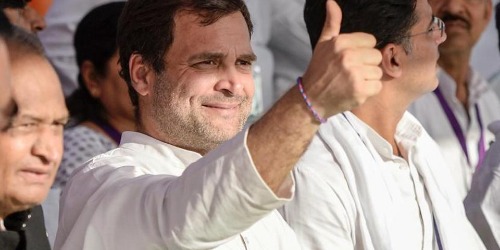
Indian National Congress on Tuesday released its manifesto eight days ahead of Lok Sabha polls 2019. Congress President Rahul Gandhi, Sonia Gandhi and former PM Manmohan Singh were present at the launch of Congress manifesto in Delhi. Here's a look at the five key announcements in the manifesto of Congress for Lok Sabha elections 2019.
Nyuntam Aay Yojana (NYAY)
The manifesto mentions NYAY scheme as one of its key components which entails the transfer of Rs 72,000 per year to the poorest 20 percent of households in India. It will be transferred to the woman in the household, as far as possible.
Commenting on how BJP has been saying that implementing NYAY scheme won't be possible, Rahul Gandhi said, "It might be impossible for BJP. They said the same thing about MNREGA but it helped people of the country. It is impossible for BJP but it is possible for Congress and we will do it."
"Believe in me, I don't lie. I won't promise Rs 15 lakh but I will promise Rs 72,000," added Gandhi.
Focus on jobs
The Congress manifesto promises to make job creation as No.1 priority, both in the public and private sector.
The party has announced it would ensure 34 lakh jobs in the public sector by
a. Filling all 4 lakh central government vacancies before March 2020.
b. Persuading the state governments to fill their 20 lakh vacancies.
c. Creating an estimated 10 lakh new Seva Mitra positions in every gram panchayat and urban local body.
It will also ensure an increase private sector jobs by
1. Rewarding businesses for job creation and employing more women,
2. Requiring businesses with over 100 employees to implement an apprenticeship programme.
Party President Rahul Gandhi said jobs and farmer welfare were the key issues for Congress in this election.
Farmer welfare
The party will take several steps for the welfare of farmers. Congress will put farmers on the path from 'Karz Maafi', to 'Karz Mukti', the manifesto said. This will be done through remunerative prices, lower input costs, and assured access to institutional credit.
The party has promised a separate "Kisan Budget" every year. A permanent National Commission on Agricultural Development and Planning has also been promised.
Universal Healthcare
The party has promised to enact the Right to Healthcare Act and guarantee every citizen free diagnostics, out-patient care, free medicines and hospitalisation, through a network of public hospitals and enlisted private hospitals. The party has promised to double its expenditure on healthcare to 3 percent of GDP by 2023-24.
Quality Education for All
School education from Class I to Class XII in public schools shall be compulsory and free, the manifesto said. The party will ensure that schools have adequate infrastructure and qualified teachers. To achieve this, the allocation for education will be doubled to 6 per cent of GDP by 2023-24.
Is the Congress Manifesto for 2019 elections good enough to beat BJP?
India tests anti- satellite missile system, codenamed Mission Shakti
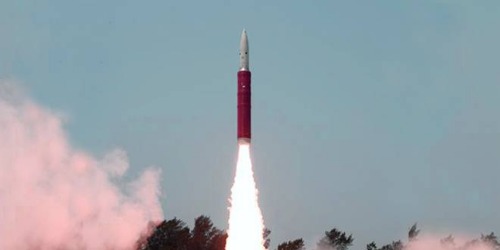
India has successfully test-fired a sophisticated anti-satellite missile in ‘Mission Shakti’ and shattered a live satellite flying in the low-Earth orbit. With this successful space mission, India has become the fourth country to attain such a specialized and modern capability; making it a ‘space superpower’. Prime Minister gave assurance to the international community that “our capability will not be used against any person but is merely India's defence initiative for its security. We are against arms race in the space. This test will not violate any international law or treaties."
Important things to know about Mission Shakti
1. Mission Shakti’ is an anti-satellite missile test, under which an Anti-Satellite or ASAT missile shot down the Low Earth Orbit satellite ‘in 3 minutes of launch’.
2. The satellite that has been used in the mission was one of the country’s existing satellites working in lower orbit. The satellite was in orbit at 300 km when it was smashed.
3. The successful launch of the ASAT has made India enter the exclusive group of countries with capabilities to launch such sophisticated missiles. It is now the 4th country to have successfully tested the Anti-Satellite missile after US, Russia & China.
4. The whole effort of Mission Shakti is original and has been executed by the Defence Research & Development Organisation (DRDO).
5. India, with Mission Shakti, has successfully exhibited its capability to bar and seize a satellite in outer space based on complete indigenous technology.
6. DRDO's Ballistic Missile Defence interceptor was used for Mission Shakti, which is part of the continuing ballistic missile defense programme.
7. The anti-satellite missile test was conducted in the lower atmosphere to make sure that there is no space debris. Whatever wreckage is generated will decompose and fall back in the earth within weeks.
Prime Minister has called it a test of India's potential to bring down low orbit satellites and stated that India's action was not directed against any nation. Modi in a tweet said, "Mission Shakti was a highly complex one, conducted at extremely high speed with remarkable precision. It shows the remarkable dexterity of India's outstanding scientists and the success of our space programme”.
He also said that Mission Shakti has strengthened India's space programme and it is a step towards the country’s safety, security, economic growth, and technological advancement.



